- Home
- Al Sarrantonio
Halloweenland Page 11
Halloweenland Read online
Page 11
“Sorry,” Malone said. “But you do look better already, you know. None of that boozing by yourself in your little room. You know, you’ve been as good for me as I have for you. I feel like I’m accomplishing something.”
“When we talk to that woman tomorrow we will be,” Grant said.
“We would have gotten nothing out of her today,” Malone said. “The old Irish need to be finessed. If we’d barged in there at supper time she would have shut the door in our faces.”
“I’ve got to trust you on this one. Back in the states—”
“Back in the states you would have drawn your police special and kicked down the door.” He raised his glass. “And tonight, a little Irish music. There’s a place a short walk down the street that pulls a good pint and puts on a good show. None of that phoney tourist cabaret crap. This is the real stuff.”
Grant raised his own glass, but he was already thinking about tomorrow, and talking to the woman Megan Conner.
CHAPTER THIRTY-EIGHT
The Slieve Mish Mountains on the way to the Dingle peninsula were spectacular, covered from foot to tip with sheep pastures and stark white limestone rock outcroppings, with the Atlantic Ocean roaring below. The sky had cleared and again was that high, eye-hurting blue. They stopped in Dingle, a fishing town with a beautiful harbor dotted with red and green boats, and ate an early lunch of hamburgers, which seemed out of place. Across the street was a pub named Murphy’s, with a brightly painted green fish-and-chip stand next to it, not yet opened.
“Does every town in Ireland have a Murphy’s Pub in it?” Grant asked.
“Pretty much.”
Malone threw down some euros and they left.
“Keep an eye out, Bill, it should be somewhere up here on the right.”
More sheep on the left, down below the cliffs which led to the blue sea. Boats tore along the coastline. It was even brighter here, and the day had turned warm. Grant was in his shirtsleeves and peering to the right up the limestone jutted green grass.
“That’s got to be it.”
They had passed other beehive huts, which were originally built by monks centuries ago. They were stone structures, akin to American Indian teepees, and made to house a solitary worshiper.
But this one was different. There was a bus parked on the left of the road, and a swarm of tourists were snapping digital pictures without crossing. The beehive was beautifully constructed, and next to it was a farmhouse. In the doorway Grant caught a glimpse of an old woman with a cell phone in her hand.
Malone pulled up behind the bus and they waited.
In a few minutes the bus reloaded, and amidst words like, “Pay her to look at it up close—no way!” and with a chuff of diesel smoke the bus pulled out onto the narrow road and rolled away.
The doorway was empty now. Grant and Malone got out of the car and crossed the road. They climbed the gentle slope of the front yard and stood in front of the beehive structure. Grant peered in but it was empty save for a tip jar just inside the opening.
“Cheap bastards,” someone muttered, and Grant straightened to see the old woman in the doorway of the farmhouse again, cell phone pressed to her ear. “Talk to you later, then,” she said and folded the phone as she tottered down toward them, all smiles.
“Not you gents, o’course!” she said. “Meaning cheap and all. The bus people, I call ’em, and they hardly ever cross the road, so scared of parting with a euro they are.”
She smiled as Malone opened his wallet and stooped to put a bill into the tip jar.
“Go in if ye like!” she said robustly. “Personal home of St. Thaddeus, in the fort’ century, I have it on good autority.”
“Are you Meg Conner?” Grant asked.
She put her hands on her hips. “In d’ flesh. And who might you be?”
Malone said, “You know Doctor Farrely at Trinity College?”
“Sure I do.”
“He sent us,” Malone explained.
“A bit of a twerp, he is,” Meg Conner answered, “but he has a good heart, I tink. His head’s too much in the books, though, if you ask me.”
Grant said, “He told us you knew something about Samhain—”
“God bless us!” Conner blurted, crossing herself. Her face became flushed, and she looked across the road as if expecting something to appear.
“Can we—” Grant began.
“Come in the house then, and I’ll tell ye. This is no place to be telling stories, in the light of day. I’ll make tea if ye like, but it’ll cost ye a euro apiece.”
“That’d be fine,” Malone said, and they followed her to the door of the farmhouse and then inside. She closed and then bolted the door, and pulled down the shade on the single window facing the street.
“Sit down, then,” she said. “I’ll be gettin’ yer tea.” She nodded at the jar on the coffee table, which was stuffed with bills.
Grant added two more, and then sat down in two overstuffed easy chairs, leaving the floral printed couch for Meg Conner. The room was small and stuffy, and a cuckoo clock ticked annoyingly on one wall next to a set of curio shelves holding tiny crystals birds.
In a few minutes they heard the whistle of the kettle, and then Meg Conner appeared with a tray with two steaming cups on it.
“None for me, not at this time of day,” she announced, and put the tray down on the table and sat down with an “Oof!”
“So little Doctor Farrely sent you, did he? I’m sure he doesn’t believe a tenth of what I tell him. But I’ve never lied a day in me life.” She pointed to her eyes. “I seen changelings with these, I have, and once a banshee. Not something you’d like to see twice, I can tell you.”
Grant sipped the tea, which was little more than hot water.
Meg Conner was staring at him, her hard little pinched face filled with sudden fury. “And I saw the Lord o’ Death himself, I did, not two days ago.”
“That’s what Doctor Farrely told us,” Malone said.
Meg was still staring at Grant, studying him, it seemed.
“And you’ve seen ’im too, you have. I can tell.”
Grant nodded slowly.
“And he’s done you a bad turn or two, I’d say.”
“We’ve . . . had our run-ins.”
She turned to Malone. “And you believe none of it, do you?”
“Actually, no . . .” Malone replied mildly.
“Well I would if I was you. Because you’re going to see him soon, you are. I can read it in your face.”
She turned back to Grant. “He’s been gone from this place a long time, he has. And then he came back, for his own reasons, I’d say. Me grandmother used to tell us stories, only half of which I dared believe, and now I’m telling them to you. This used to be his place, and now he’s come home. And I saw him as clearly as I see you.”
“Where?”
“On the Burren.”
Malone laughed. “The Burren? There’s nothing on the Burren!” He looked at Grant. “It’s an area of rounded limestone hills. There’s so much limestone that it looks like the surface of the moon. Nothing there but rocks and a few wild flowers which grow in the crevices.”
Meg said, ignoring him, “I was on my way with me son to visit me sister in Galway, and on the Burren at night I saw him.”
“Did your son see anything?”
“Driving he was, and I didn’t want to scare him half to death. But there outlined against the rising moon he was, big as death, a black cape and a pale white face. He turned to look at me but I closed my eyes I did, only I caught the faintest glimpse of his expression and it was the saddest thing I’ve ever seen.”
“Sad?” Grant asked.
“That it was. Like the sadness of all the world on his shoulders. Then he turned away and stared out at the Burren, all alone. But that’s not all I saw. I saw the Devil’s own child the same day!”
Malone was ready to laugh again but Grant shot him a look that silenced him.
“What do you mea
n, ‘the Devil’s child’?”
“Would you like some more tea?” Meg asked. She nodded at the money jar.
Grant took two bills from his wallet and stuffed them into the jar. “You don’t have to bother with the tea. Just tell me what you saw.”
Meg settled herself on the couch. She stole a look at the cuckoo clock on the wall. “I’ll be having to make this quick. There’s another tour bus due in a bit, and I have to call me friend Eileen before that . . .”
“What did you see?” Grant persisted.
She folded her hands in her lap and looked hard at Grant. “Like I said, the Devil’s own child. I was waiting for Curley, my youngest, to pick me up. He asked me to stand on the far side of the road, above the sheep pasture, so he doesn’t have to put the car up the driveway. He’s not so good a driver, and has trouble backing it up, he does. So I’m standing there, minding my own business, and I look down into Mr. Inagh’s pasture and there’s one of his sheep dead on the ground, and this girl standing over it.”
“The girl killed the sheep?” Malone asked, incredulously.
“Oh yes, she did all right. Because I saw her do it again. All she did was look at it, and give it the lightest of taps, and down it went, dead as a fence post. And I was so afraid that she’d look up and see me that I ran across the road, and don’t you know Curley nearly run me down. I got into that automobile faster than I’ve ever done anything in me life, you can be sure, and I’m almost eighty but a year. And then that very same night on the Burren I saw the Lord of Death himself.”
She shut her mouth like a trap, and sat looking from one to the other of them. Finally Grant said, “Anything else, Meg?”
“Ain’t that enough? The Devil’s child and Death himself in one day!”
Grant peeled off a few more bills and jammed them into the jar as he rose. Malone was already out of his chair and heading for the door.
Suddenly Meg Conner scooted ahead of them, her cell phone already open.
“Eileen?” she said into the phone, as another tour bus pulled up in front of Malone’s car and opened its door with a wheeze.
“Eileen, the three-thirty is here, it is! What’s the bet, then?”
There was a mumble on the other end.
“Ha!” Meg chortled. “And take it I will! Stinkin’ bus people! And I know that not one of the cheap bastards’ll cross the street, just like the last one!”
She stood in the now open doorway staring at the bus as Malone and Grant walked down to the car.
As they got into the car Malone laughed sharply and said, “Did you believe a single word she said?”
Grant stared through the windshield.
“Every word of it,” he said.
CHAPTER THIRTY-NINE
After an hour of argument, Malone agreed to take Grant to the Burren the next day. They ate dinner at the hotel in Killarney. Grant was already sick of the Irish custom of serving potatoes with every meal, sometimes in three different forms. The steak Grant had ordered (local Angus beef, which was excellent) came on a bed of mashed potatoes, with a bowl of boiled potatoes for the table. And every lunch and dinner he had had was also accompanied by family-style vegetables in the Irish flag colors: inevitably green beans, cauliflower and carrots, all steamed to tastlessness.
Malone speared a boiled potato and held it up. “Do you know where this comes from?” he asked.
Grant shook his head.
“Cyprus. They’re imported, all of them. I have yet to eat a potato that was grown in Ireland.”
Malone’s face was more flushed than usual, and Grant asked, “Are you okay, Tom?”
“Just a little tired, is all. You’ve already given me more activity than I’ve had in years. I must say I’ve enjoyed it, though.”
Grant leaned across the table. “This stuff is real, you know.”
Malone shrugged, put another potato on his dish and cut into it with his fork. “It’s all the same to me, Bill. I don’t mind telling you I don’t believe a single bit of it. But you do, and it gets both of us out of the house. I forgot how much I missed real police work. I told you before, Riley Gates vouched for you and that’s all I need. The rest is just recreation. Whether you find your boogeyman or not, the chase has been fun. And I want you to look in the mirror before you go to bed tonight. Two days off the hard booze and butts and you look like a different man. I’m proud of myself, I am.”
Grant nodded. “I have you to thank.”
“Yes, you do. It’s been good for me to boss somebody around. Been a while.” He pointed to Grant’s plate with his fork. “Eat your potatoes, boyo. Good for you.”
Grant groaned.
After dinner Grant was ready for bed but Malone dragged him to a singing pub in time to hear some traditional Irish music. It was crowded and noisy, but the music was good. The Guinness, though, only made him sleepier. He had actually nodded off at their tiny table when he was jostled awake by Malone’s beefy hand.
“Time to go,” the old cop said. “I’m tired myself and we have a bit of a drive tomorrow. We’ll go on to Galway after the Burren, if you like. Cheaper than staying here another night. You’ll like Galway, you will. Everybody does. We missed the Oyster Festival a couple weeks back but there’s plenty else to see. And it’s a college town, so maybe we’ll see some pretty girls.”
Malone smiled at him. “So what’ll it be? On to Galway after tramping around the Burren looking at nothing?”
“Galway sounds fine.”
“Good then.”
Grant didn’t tell him that he had no idea if they would ever leave the Burren alive.
CHAPTER FORTY
“They brought Neil Armstrong, the Apollo astronaut, here, and he said it was the only place on Earth that looked like the surface of the moon.”
Malone stood with his hands on his hips, surveying the rocky landscape while Grant searched the four horizons. It was a raw, blustery day, clouds and blue sky occasionally trading places, and there had been a sprinkle of rain on the ride up. They had checked out of their hotel in Killarney, their bags thrown in the back of the Toyota.
Below and to their right lay a verdant green valley, as out of place in this alien landscape as a golf course on the planet Mars. All else was limestone, the rocks so densely packed together they looked in places like the bottom of a quarry. And yet tiny wild flowers, yellow and purple, had found purchase here and there in cracks, in the narrow spaces between rocks.
Grant made a slow surveying circle, and Malone laughed, then coughed.
“No sign of your boogeyman, Bill?” he asked, laughing again. “We’ve been here a bloody hour and the rocks haven’t changed, far as I can tell.”
He coughed again. “I’ve got to sit down, boyo.”
He ambled off to the car, and Grant looked after him with concern. Malone looked no better today than he had the night before—his ruddy complexion had washed to paleness, and twice they had to pull over for him to catch his breath. He claimed it was nothing, that he was “just tired and old,” but Grant wasn’t so sure.
“Maybe we should head out to Galway soon,” he said, reluctantly, and Malone gave a wave as he climbed into the car and sat down, putting his head back on the rest and closing his eyes.
“Anytime, boyo,” Malone said.
Grant shaded his eyes against the sudden appearance of the sun, and looked to the north, the west—
There was a figure to the west, darkly outlined against the gray-white rocks. A black cape, swirling independent of the breeze.
“Tom,” Grant said, but the figure in the car looked asleep.
Grant began to climb over rocks toward the distant specter, who was unmoving, staring out across the Burren, seemingly unheedful of Grant.
The day darkened, gray clouds rising from the west behind Samhain and climbing the sky. The sun retreated and then was gone, and a chill rain began to fall.
“Samhain,” Grant called, as he got nearer, but the figure refused to acknowledge him.
> Grant drew close, and now Samhain turned slowly to face him.
“We meet again,” he said, the slash of mouth forming something like a smile. But the hollow eyes were empty, and there was, as Meg Conner had said, a great aura of melancholy about him.
“Where is she?” Grant said.
Slowly, the specter shrugged. “Not here. Not anymore. She went on without me.”
“Why?”
Samhain paused, then looked to the west once more. “Because I failed her. Because I won’t help her.”
There was a long pause. “Because, Detective, I discovered that there is another hand in all this.”
Again he looked to the west.
“She has to be stopped, Samhain,” Grant said.
“I agree. There are . . . things already in the works.”
“What things?”
“The future,” Samhain said, again turning his blank oval face to Grant, “remains to be seen.” Without pause he said, “For millennia, I thought the Dark One was my master. I always knew who the Dark One was. But I never knew who I was.
“Do you know, this is where I started on this planet. It was a long time again. It was barren then and it’s still barren. I used to treasure the barrenness. But now I don’t. Something has happened to me and I don’t know what. There were other places, before this planet, and I don’t have a clear memory of them. Only hints that have come back to me. Don’t you find that sad, Detective? I have no memory of my own . . . beginnings.
“In a way I thought myself a god—but what am I god of? Death? It happens every day, every hour, every second. It’s happening as we speak, all around us. I could raise one of these sterile-looking stones and we would find some vile insect eating some other vile insect. Within twenty miles of where we stand, someone is dying.
“I thought I hated life, Detective, but I don’t. This is the odd and dangerous truth, and something I never fully realized.
“And I served a false god, it seems.”
“If we don’t stop her, she’ll destroy everything.”
Samhain sighed. “Oh, yes, she certainly will. It’s what the Dark One has always longed for—the absolute negation of life. And, if there is no more life, there will be no more death. I knew that, of course, but I’m afraid the finality of it escaped me.”

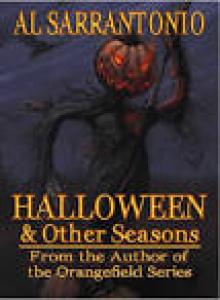 Five World Saga 01 Hornets and Others
Five World Saga 01 Hornets and Others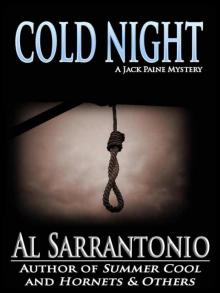 Cold Night (Jack Paine Mysteries)
Cold Night (Jack Paine Mysteries)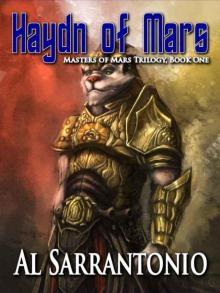 Haydn of Mars
Haydn of Mars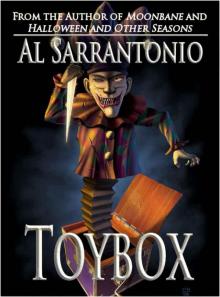 Toybox
Toybox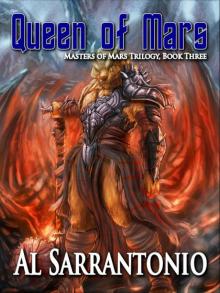 Queen of Mars - Book III in the Masters of Mars Trilogy
Queen of Mars - Book III in the Masters of Mars Trilogy Exile
Exile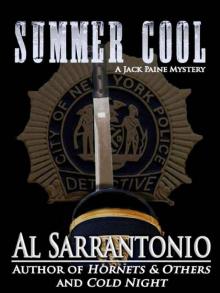 Summer Cool - A Jack Paine Mystery (Jack Paine Mysteries)
Summer Cool - A Jack Paine Mystery (Jack Paine Mysteries)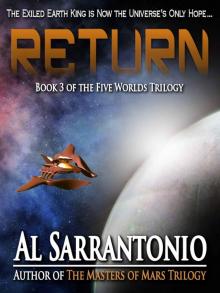 Return - Book III of the Five Worlds Trilogy
Return - Book III of the Five Worlds Trilogy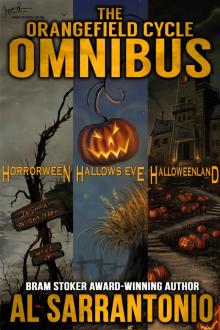 The Orangefield Cycle Omnibus
The Orangefield Cycle Omnibus Summer Cool jp-2
Summer Cool jp-2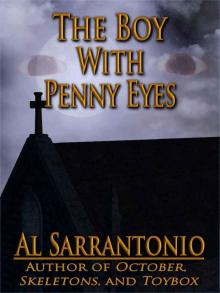 The Boy With Penny Eyes
The Boy With Penny Eyes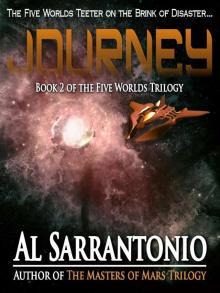 Journey - Book II of the Five Worlds Trilogy
Journey - Book II of the Five Worlds Trilogy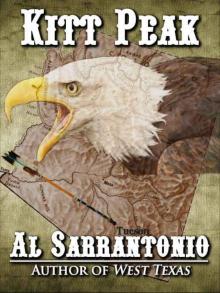 Kitt Peak
Kitt Peak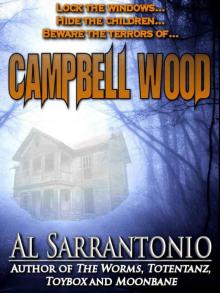 Campbell Wood
Campbell Wood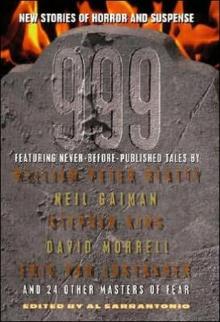 999
999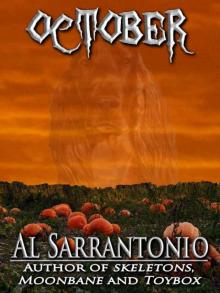 October
October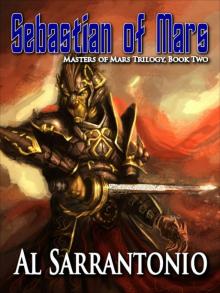 Sebastian of Mars
Sebastian of Mars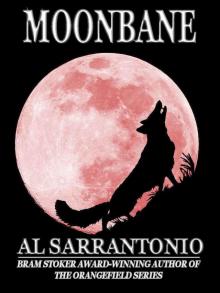 Moonbane
Moonbane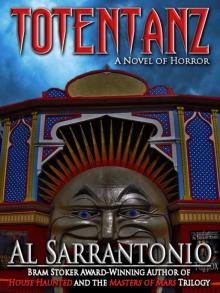 Totentanz
Totentanz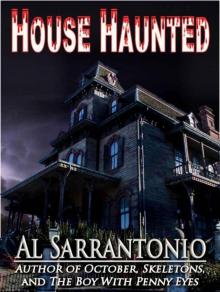 House Haunted
House Haunted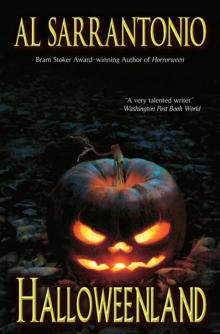 Halloweenland
Halloweenland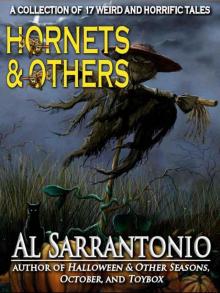 Hornets and Others
Hornets and Others